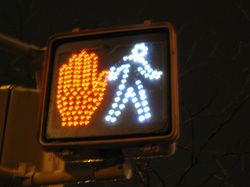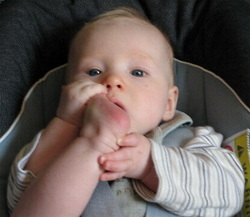Everyone gets nervous about doing a live radio or TV interview. However, that's no reason to turn down the chance to speak to a 'congregation' of several thousand people.
There seems to be a few common fears which put many people off:
Most of these can be overcome with a bit of preparation.
There seems to be a few common fears which put many people off:
- "My words will be twisted"
- "I won't know the answers"
- "I'll say something stupid"
- "They'll uncover something controversial"
- "I hate the sound of my own voice!"
Most of these can be overcome with a bit of preparation.
1. Key messages
Rather than worrying about every possible question, think about the main topics that are likely to come up.
You can then develop some 'key messages' that you want to get across. Start by making a pretty broad list, perhaps a page full of key points about the subject. Then, try to summarise them into three key messages.
Throughout the process, ask yourself: "What do you want the listener to take away from the interview?". If you’re not sure what you want to get from the interview, look at the Why Bother? section.
You can then develop some 'key messages' that you want to get across. Start by making a pretty broad list, perhaps a page full of key points about the subject. Then, try to summarise them into three key messages.
Throughout the process, ask yourself: "What do you want the listener to take away from the interview?". If you’re not sure what you want to get from the interview, look at the Why Bother? section.
2. Pre-empt obvious questions
An endless list of pre-prepared answers is not the solution as the interviewer is unlikely to ask exactly what you expect.
However, it's worth thinking through a handful of obvious questions and how you would work in your key messages. For example, many interviews start with a variation on the question - "What's going on?"
Never give the impression that you think the interviewer is daft for asking a silly question. Instead, see these questions as an 'open goal' - allowing you to get your point of view across.
However, it's worth thinking through a handful of obvious questions and how you would work in your key messages. For example, many interviews start with a variation on the question - "What's going on?"
Never give the impression that you think the interviewer is daft for asking a silly question. Instead, see these questions as an 'open goal' - allowing you to get your point of view across.
3. Relax – they probably don’t want you to look stupid

Pulling your hair out is unlikely to help
Telling someone who is stressed that they need to relax is likely to leave you with a black eye.
However, it’s worth bearing in mind that unless your story is controversial or you are a local politician, then they probably don’t want you to look silly.
You’re unlikely to get a list of questions in advance but you can usually ask for a general idea of what kind of things you might be asked about.
Producers like to have a range of voices as guests on the air, so try not to feel self conscious.
However, it’s worth bearing in mind that unless your story is controversial or you are a local politician, then they probably don’t want you to look silly.
You’re unlikely to get a list of questions in advance but you can usually ask for a general idea of what kind of things you might be asked about.
Producers like to have a range of voices as guests on the air, so try not to feel self conscious.
4. Tone
Be enthusiastic, personal and positive. One Sunday producer at the BBC said that her biggest gripe was clergy who came across as ‘earnest’ rather than sincere.
Try to think of it as a chat to a large group rather than a sermon.
Intonation in your voice is good as it will help listeners remember what you said.
Try to think of it as a chat to a large group rather than a sermon.
Intonation in your voice is good as it will help listeners remember what you said.
5. Avoid jargon and acronyms

Transubstantiation is not a media friendly word
If you want to reach people who aren’t already in the church, don’t spend your whole interview talking about ‘the holy blood of the lamb’ or the need for ‘greater ecumenical vision’.
However, do consider ‘name checks’. Many listeners will have missed the start of the interview, so won’t know who you are or what you are representing (e.g. “At St. Pauls church we think that Sunday morning isn’t all about dusty hymnbooks”)
However, do consider ‘name checks’. Many listeners will have missed the start of the interview, so won’t know who you are or what you are representing (e.g. “At St. Pauls church we think that Sunday morning isn’t all about dusty hymnbooks”)
6. Answer length
There are no strict rules but aim for an answer of between 10 and 30 seconds -any shorter isn't a chat, any longer can be a bit dull.
Consider answering by repeating part of the question to keep your answers clear and 'media friendly'. (e.g. Q. “So why should people come along?” A: “Everyone should come along this Saturday because…”).
Consider answering by repeating part of the question to keep your answers clear and 'media friendly'. (e.g. Q. “So why should people come along?” A: “Everyone should come along this Saturday because…”).
7. One question, one answer

A long list can be confusing
Generally speaking, each answer should only attempt to make one point.
There are three reasons why you shouldn’t answer in massive lists. Firstly, because it makes it difficult to edit out a soundbite. Secondly, because you’ll forget your final point. And third…erm, what was the third point?
There are three reasons why you shouldn’t answer in massive lists. Firstly, because it makes it difficult to edit out a soundbite. Secondly, because you’ll forget your final point. And third…erm, what was the third point?
8. What I can tell you is…
You will occasionally be asked a question you don’t know the answer to.
A useful technique is to steer the question around to what you do know about.
For example, if you were new to a church and were organising a fun run, you might not actually know how much money has been raised in the last ten years through the event.
However, you could respond by saying “Well, I’m still quite new to this, but what I can tell you is that this year we’re hoping to raise well over three thousand pounds – and we need the support of everyone in Sometown to achieve that”
It keeps the conversation going and gets your message across.
On a similar note - as you become more confident you might attempt to steer the conversation round to something you would like to talk about. A good interviewer will pick up on the things you say rather than sticking to a list of questions. Consider throwing in some carefully crafted 'teases' towards the end of an answer which the journalist can then pick up on.
For example, you might be giving an interview about a Christmas Carol concert but you would rather talk about your upcoming Alpha Course. The conversation might go something like this:
Q: "I imagine Christmas is the busiest time of year for a clergyman?"
A: "Well, it's certainly one of them! The Christmas Carol service is a big event and it takes a lot of work from our congregation to make it happen, but we've also got some really exciting plans for the new year which are going to keep us busy..."
A decent interviewer will be listening carefully enough to ask you to explain more.
A useful technique is to steer the question around to what you do know about.
For example, if you were new to a church and were organising a fun run, you might not actually know how much money has been raised in the last ten years through the event.
However, you could respond by saying “Well, I’m still quite new to this, but what I can tell you is that this year we’re hoping to raise well over three thousand pounds – and we need the support of everyone in Sometown to achieve that”
It keeps the conversation going and gets your message across.
On a similar note - as you become more confident you might attempt to steer the conversation round to something you would like to talk about. A good interviewer will pick up on the things you say rather than sticking to a list of questions. Consider throwing in some carefully crafted 'teases' towards the end of an answer which the journalist can then pick up on.
For example, you might be giving an interview about a Christmas Carol concert but you would rather talk about your upcoming Alpha Course. The conversation might go something like this:
Q: "I imagine Christmas is the busiest time of year for a clergyman?"
A: "Well, it's certainly one of them! The Christmas Carol service is a big event and it takes a lot of work from our congregation to make it happen, but we've also got some really exciting plans for the new year which are going to keep us busy..."
A decent interviewer will be listening carefully enough to ask you to explain more.
9. Deflect controversy

Foot in mouth disease should be avoided...
If your press release is non-controversial, you’re unlikely to face a barrage of difficult questions. However, it's worth being aware of your 'skeletons' and thinking how you would deal with them.
You might like to consider the ‘ABC’ technique.
For example, if you were asked why building the church extension was causing such disruption you could:
A - Acknowledge that it’s not a stupid question (“Yes, there is a lot of building work going on and unfortunately it is inconvenient for some local people…”).
B - Change the direction of the question with a ‘Bridge’ (“…but what we’d like to say to local people is that…”).
C - Communicate your message (“….this will soon be a bigger, brighter church which will be at the centre of the community. It’ll be a place for people to come together for everything from scout groups to prayer groups. So if you can just bear with us, it will be worth it!”)
It’s also worth saying that it’s better to try to find common ground rather than highlighting the church’s denominational squabbles, which are unlikely to entice anyone to turn up on a Sunday morning for the first time.
You might like to consider the ‘ABC’ technique.
For example, if you were asked why building the church extension was causing such disruption you could:
A - Acknowledge that it’s not a stupid question (“Yes, there is a lot of building work going on and unfortunately it is inconvenient for some local people…”).
B - Change the direction of the question with a ‘Bridge’ (“…but what we’d like to say to local people is that…”).
C - Communicate your message (“….this will soon be a bigger, brighter church which will be at the centre of the community. It’ll be a place for people to come together for everything from scout groups to prayer groups. So if you can just bear with us, it will be worth it!”)
It’s also worth saying that it’s better to try to find common ground rather than highlighting the church’s denominational squabbles, which are unlikely to entice anyone to turn up on a Sunday morning for the first time.
10. Role play
Give a colleague a copy of your press release and ask them to interview you as if they know nothing else about the event.
Ask them to take a note of your persona, your language and your ‘message’ (what they took from the interview).
You may find it useful to download the interview practice sheet below (right click, 'save as').
Ask them to take a note of your persona, your language and your ‘message’ (what they took from the interview).
You may find it useful to download the interview practice sheet below (right click, 'save as').
TV interviews
Much of the advice on radio interviews can be applied to television. There are though some extra things to consider with screen interviews.
- Keep eye contact with the interviewee as much as possible - don't look at the camera.
- Dress to match the tone of the story. If it's a light story, you don't need to wear a jacket and tie. If you're commenting on the death of someone in the village, go formal.
- If you're sitting down, don't slouch. Put your bottom in the back of the chair and lean forward slightly.
- Get someone to practice with you and help you spot your 'nervous fiddles'. Do you jangle your car keys? Do you rock back and forth?
| Interview role play worksheet | |
| File Size: | 39 kb |
| File Type: | |
